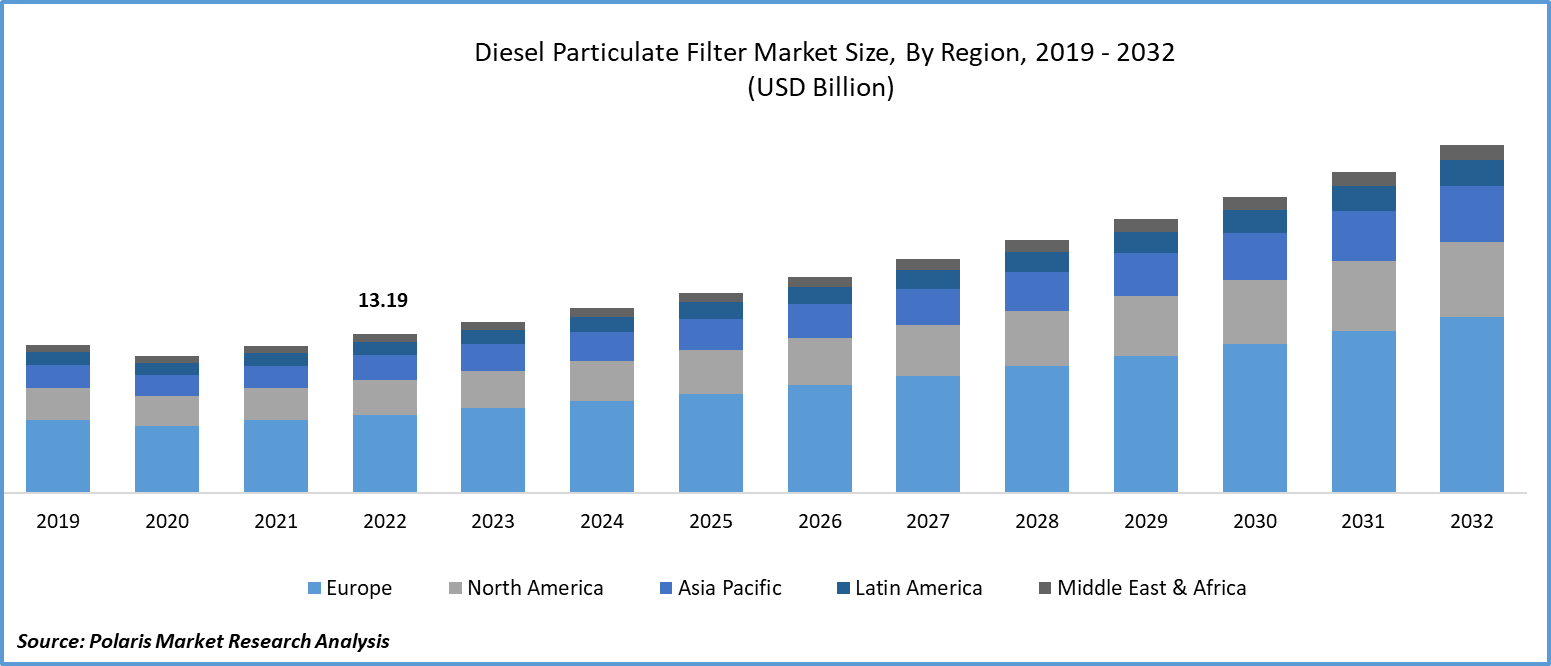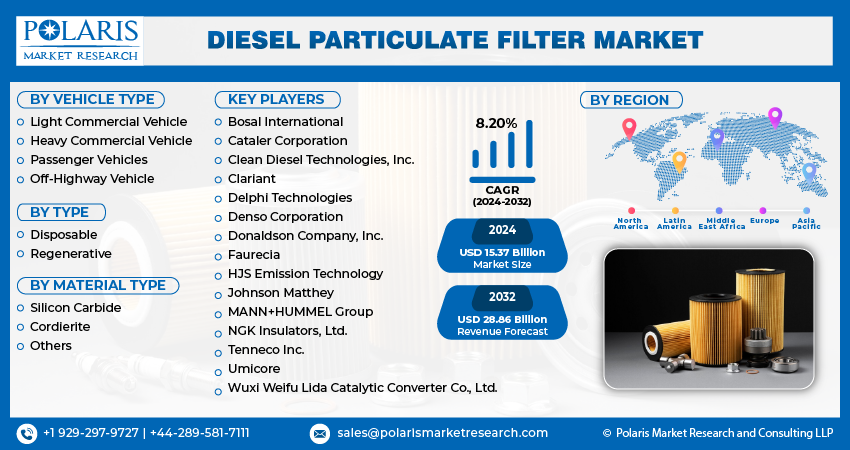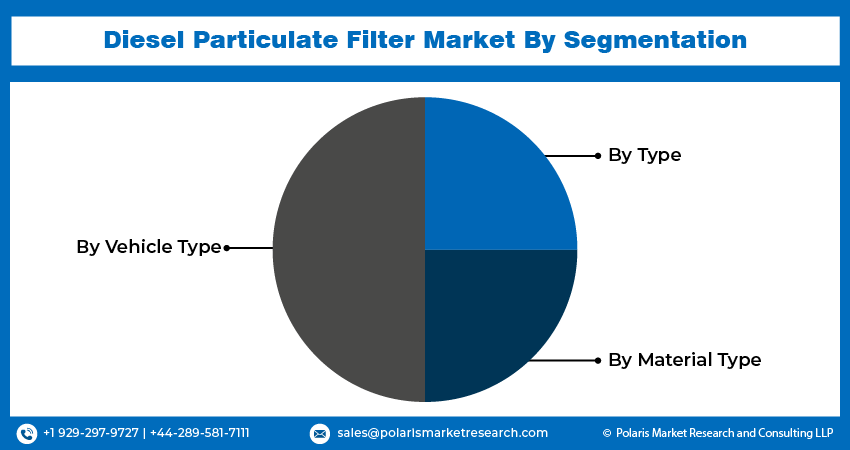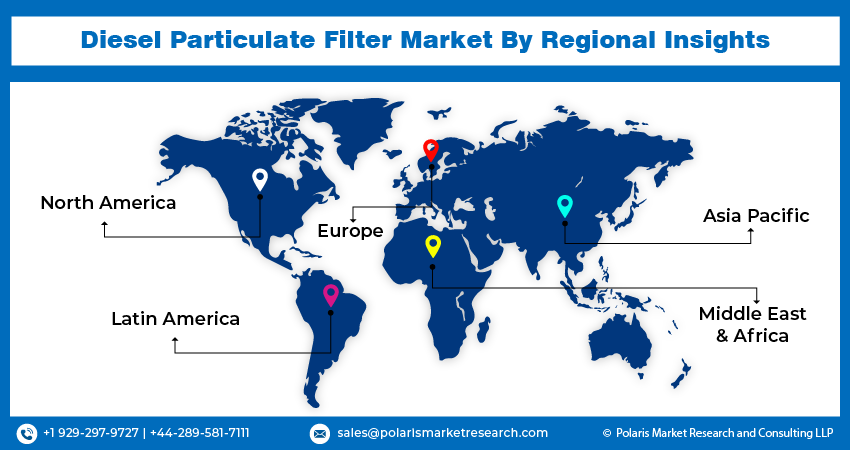
Diesel Particulate Filter Market Share, Size, Trends, Industry Analysis Report
By Vehicle Type (Light Commercial Vehicle, Heavy Commercial Vehicle, Passenger Vehicles, Off-Highway Vehicle); By Type; By Material Type; By Region; Segment Forecast, 2024 - 2032
- Published Date:Jan-2024
- Pages: 118
- Format: PDF
- Report ID: PM3995
- Base Year: 2023
- Historical Data: 2019-2022
Report Outlook
The global diesel particulate filter market size and share was valued at USD 14.23 billion in 2023 and is expected to grow at a CAGR of 8.20% during the forecast period.
The diesel particulate filter (DPF) market has witnessed a substantial surge in recent years, driven by increasing global awareness regarding environmental pollution and stringent emission regulations imposed by various governments. This surge is indicative of a collective effort by industries and regulators to combat the adverse effects of particulate matter emissions from diesel engines.
An exhaust after-treatment tool called a diesel particulate filter, or DPF collects particulate matter like ash and soot. Typically, a DPF uses a substrate built into the shape of a honeycomb consisting of ceramic material. Diesel particulate filters collect and hold exhaust soot to reduce emissions from diesel cars; however, the soot must be burned off regularly to replenish the filter. Excess soot that has accumulated in the filter is ignited during the regeneration procedure, preventing dangerous exhaust emissions and the black smoke that is frequently released from diesel vehicles when they accelerate.
Moreover, one of the best methods available now for reducing diesel particle emissions is diesel particulate filtering. Diesel particulate filter market demand is increasing due to a rise in sales of large commercial vehicles in the transportation and construction sectors. Environmental concerns are the primary driving force behind the need for longer-lasting diesel particle filters, and the industry is seeing rapid growth.

To Understand More About this Research: Request a Free Sample Report
The diesel particulate filter market is a segment within the broader automotive emission control system industry. It encompasses the production, distribution, and maintenance of DPFs, catering primarily to automotive manufacturers, aftermarket suppliers, and service providers
Continuous research and development efforts in the field of emission control technologies have led to the creation of more efficient and durable DPF systems. Advancements in materials and manufacturing processes have resulted in higher-performing filters that require less frequent maintenance.
- For instance, in December 2022, Camfil introduced the latest iteration of V-Bank HEPA filters, boasting an extended lifespan and reduced maintenance and energy expenditures.
However, the initial cost of diesel particulate filter systems can be a deterrent for some consumers, especially in regions with price-sensitive markets. Also, proper maintenance and periodic regeneration are crucial for the optimal performance of DPFs. Neglecting these aspects can lead to reduced efficiency and potential damage to the filter.
Further, technological adaptation is another factor hindering the growth of the diesel particulate filter market. Ensuring compatibility with various engine designs and staying abreast of evolving emission standards require continuous innovation and investment.
The diesel particulate filter market report is a comprehensive assessment of all the opportunities and challenges in the industry. It covers all the recent innovations and major events in the industry while shedding lights on the key market features such as CAGR, supply/demand, cost, production rate and consumption. Along with that, the study offers a thorough analysis of the key market dynamics and latest trends to help businesses develop strategies that will drive diesel particulate filter industry growth.

The diesel particulate filter market is poised for continued expansion. As environmental regulations tighten and automotive technologies evolve, the demand for efficient emission control systems, including DPFs, is expected to grow. Additionally, ongoing research efforts are likely to yield even more advanced and cost-effective DPF solutions, further solidifying their role in combating air pollution.
The research study provides a comprehensive analysis of the industry, assessing the market based on various segments and sub-segments. It sheds light on the competitive landscape and introduces Diesel Particulate Filter Market key players from the perspective of market share, concentration ratio, etc. The study is a vital resource for understanding the growth drivers, opportunities, and challenges in the industry.
Growth Drivers
- Rise in environment awareness is projected to spur product demand.
Growing concerns about air quality and environmental degradation have spurred demand for cleaner technologies. Consumers, businesses, and governments are actively seeking solutions to minimize the ecological footprint of diesel-powered vehicles, further propelling the diesel particulate filter market.
Governments across the globe have implemented strict emission standards to limit the environmental impact of diesel engines. These regulations mandate the use of emission control technologies like DPFs to reduce particulate matter emissions. As a result, automotive manufacturers are compelled to incorporate DPF systems in their vehicles, driving market growth.
Report Segmentation
The market is primarily segmented based on vehicle type, type, material type, and region.
|
By Vehicle Type |
By Type |
By Material Type |
By Region |
|
|
|
|
To Understand the Scope of this Report: Speak to Analyst
By Vehicle Type Analysis
- Light Commercial Vehicles (LCV) segment is expected to witness the highest growth during the forecast period
Light Commercial Vehicles (LCV) constitute a pivotal segment within the diesel particulate filter market. These versatile vehicles, including vans and small trucks, are widely utilized in urban logistics and delivery services. Due to their frequent operation in densely populated areas, LCVs are subject to stringent emission regulations. As a result, the demand for efficient DPF systems in this category has surged. Manufacturers are focused on developing compact, high-performance DPF solutions tailored to LCVs, ensuring compliance with emission standards while maintaining optimal vehicle performance. This niche market showcases a growing emphasis on sustainable transportation solutions in urban environments.
By Type Analysis
- Regenerative segment accounted for the largest market share in 2022
The regenerative segment accounted for the largest market share in 2022 and is likely to retain its market position throughout the forecast period. These filters utilize a self-cleaning mechanism, actively burning off trapped particulate matter during operation. This process, known as regeneration, ensures sustained filter efficiency and longevity. Regenerative filters play a critical role in heavy-duty applications, where exhaust temperatures are consistently high. By reducing the need for manual maintenance and replacement, they significantly lower operational costs. This technology addresses the challenge of maintaining optimal DPF performance, particularly in vehicles with intermittent or low-speed operation, contributing to cleaner air and prolonged engine life.
However, disposable filters are a key component in the diesel particulate filter market. Unlike their counterparts, they are designed for one-time use and are replaced when saturated with particulate matter. These filters offer a cost-effective solution for applications with limited access to regeneration or where extended filter lifespan is not a primary concern. Disposable filters find favor in scenarios where convenience and simplicity outweigh the need for long-term sustainability. While they may require more frequent replacements, their lower upfront cost, and straightforward maintenance make them a practical choice for certain industries and applications within the DPF market.
By Material Type Analysis
- Silicon Carbide segment held a significant market revenue share in 2022
The silicon carbide segment held a significant market share in revenue share in 2022. It is a high-performance material used in the construction of DPF substrates. SiC's exceptional thermal conductivity and durability enable it to withstand high temperatures and harsh conditions within exhaust systems. This makes it a preferred choice for heavy-duty applications. SiC-based DPFs exhibit superior filtration efficiency and longevity, ensuring effective particulate matter capture over extended periods. Its wide adoption in modern emission control technologies underscores its pivotal role in reducing harmful emissions from diesel engines, aligning with global efforts towards cleaner air and sustainable transportation.

Regional Insights
- Europe region dominated the global market in 2022
The Europe region dominated the global market with the largest market share in 2022 and is expected to maintain its dominance over the anticipated period. The diesel particulate filter (DPF) market in Europe stands at the forefront of emission control technology. Stringent environmental regulations, particularly the Euro standards, have been instrumental in driving the demand for DPF systems. Europe's robust automotive industry, including passenger cars and commercial vehicles, fuels this market's growth. The region's emphasis on sustainable transportation solutions and reducing air pollution has amplified the significance of DPF technology.
Moreover, Europe's proactive stance on combating climate change and improving air quality has spurred innovation in DPF design and manufacturing. The market here is characterized by a diverse range of offerings, including advanced materials like Silicon Carbide substrates and regenerative filters. As governments continue to tighten emission norms and urban areas strive for cleaner air, the DPF market in Europe is expected to evolve further. The increasing adoption of electric vehicles and hybrids complements DPF technology, emphasizing the region's commitment to achieving a greener, more sustainable future for transportation.
As governments continue to tighten emission norms and urban areas strive for cleaner air, the DPF market in Europe is expected to evolve further. The increasing adoption of electric vehicles and hybrids complements DPF technology, emphasizing the region's commitment to achieving a greener, more sustainable future for transportation.
The Asia-Pacific region is expected to witness the highest growth during the forecast period. Rapid industrialization, coupled with a burgeoning automotive sector, has led to heightened concerns about air quality. Stricter emission regulations, especially in countries like China and India, have mandated the adoption of DPF technology. The commercial vehicle segment, including trucks and buses, is a major driver of this market. Additionally, a growing awareness of environmental issues and a shift towards sustainable transportation solutions further propel the demand for DPF systems. With a burgeoning middle class and increasing urbanization, the Asia-Pacific market is poised for sustained growth in the pursuit of cleaner, more eco-friendly transportation options.

Key Market Players & Competitive Insights
The diesel particulate filter market is fragmented and is anticipated to witness competition due to several players' presence. Major service providers in the market are constantly upgrading their technologies to stay ahead of the competition and to ensure efficiency, integrity, and safety. These players focus on partnership, product upgrades, and collaboration to gain a competitive edge over their peers and capture a significant market share.
Some of the major players operating in the global market include:
- Bosal International
- Cataler Corporation
- Clean Diesel Technologies, Inc.
- Clariant
- Delphi Technologies
- Denso Corporation
- Donaldson Company, Inc.
- Faurecia
- HJS Emission Technology
- Johnson Matthey
- MANN+HUMMEL Group
- NGK Insulators, Ltd.
- Tenneco Inc.
- Umicore
- Wuxi Weifu Lida Catalytic Converter Co., Ltd.
Recent Developments
- In October 2022, German luxury car manufacturer, Audi, the renowned German entered into a partnership with MANN+HUMMEL to pioneer a particulate filter for electric vehicles. This innovative filter was designed to gather particulate matter from the environment during both the driving and charging phases.
Diesel Particulate Filter Market Report Scope
|
Report Attributes |
Details |
|
Market size value in 2024 |
USD 15.37 billion |
|
Revenue Forecast in 2032 |
USD 28.86 billion |
|
CAGR |
8.20% from 2024 – 2032 |
|
Base year |
2023 |
|
Historical data |
2019 – 2022 |
|
Forecast period |
2024 – 2032 |
|
Quantitative units |
Revenue in USD billion and CAGR from 2024 to 2032 |
|
Segments Covered |
By Vehicle Type, By Type, By Material Type, By Region |
|
Regional scope |
North America, Europe, Asia Pacific, Latin America; Middle East & Africa |
|
Customization |
Report customization as per your requirements with respect to countries, regions, and segmentation. |
Explore the landscape of the diesel particulate filter market in 2024 through detailed market share, size, and revenue growth rate statistics meticulously organized by Polaris Market Research Industry Reports. This expansive analysis goes beyond the present, offering a forward-looking market forecast till 2032, coupled with a perceptive historical overview. Immerse yourself in the depth of this industry analysis by acquiring a complimentary PDF download of the sample report.
Browse Our Top Selling Reports
U.S. Residential Remodeling Market Size, Share 2024 Research Report
Animal Sedatives Market Size, Share 2024 Research Report
Biguanides Market Size, Share 2024 Research Report
Cloud Mobile Backend as a Service (BaaS) Market Size, Share 2024 Research Report
Solvent Recovery and Recycling Market Size, Share 2024 Research Report
